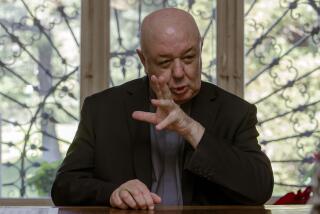A Cold War Mystery Thriller : Are Answers to Our Old Riddles in Soviet Archive?
- Share via
In his campaign to restructure Soviet society, General Secretary Mikhail S. Gorbachev has turned his historians loose in the dusty back shelves of long-sealed archives, hoping that scholarly inquiry can purge some of the lingering skeletons of Stalinism.
It sounds like a Freedom of Glasnost Act. So let me get in line with a request for documents to illuminate some of the things going on in the United States back in the Stalin era. There are surely some dossiers over there that would not jump out for priority attention by Soviet scholars, but would greatly help Americans in understanding some of our own Cold War mysteries.
Why not, for instance, let us have the Kremlin file on Whittaker Chambers and Alger Hiss? Chambers confessed to working for the Soviets in the 1930s, so there is obviously material on him in Moscow. What do the old files show about the famous “pumpkin papers” that led to Hiss’ conviction and imprisonment, generating a decade of bitter controversy in American politics?
What records did Moscow keep about the Rosenbergs, Julius and Ethel, who were executed in this country in 1953 for treason? Did they indeed serve as conduits of atomic technology to the Soviet Union, or were they scapegoats, as their defenders claim?
Episodes such as these have been studied almost to death in this country but without benefit of credible Soviet documentation--no small shortcoming.
Isn’t there more that can now be discussed about Lee Harvey Oswald’s sojourn in the Soviet Union, before he settled in Dallas? It’s after Stalin’s time, of course, but is there anything in the Soviet archives about Jack Ruby, the shady cabaret manager who killed Oswald the day in 1963 after Oswald shot President John F. Kennedy?
We know that in the immediate shock of mourning, the Soviets turned over some rather paltry police records on Oswald to the State Department. But maybe 25 years later, urged on by the general secretary himself, Russian archivists can do a little better?
Aside from the central issues involved, the Soviet Union’s Washington-watchers might derive mischievous amusement at the commotion any new documentation like this would provoke within the American political spectrum, so great is the lingering intellectual investment in one side or another of these remote episodes.
Richard M. Nixon, for one, built his early political career on the asserted perfidy of Hiss. Any new evidence confirming Hiss’ usefulness to the Soviet cause, or conversely, exonerating him from suspicions of espionage, would require certain readjustments, to say the least, of conventional political wisdom.
Evidence supplied by the Kremlin would have to be considered suspect, of course; wise historians approach any archives with some degree of skepticism as they search for ulterior motives.
But in notorious cases like the Rosenbergs or Chambers, it is a fair bet that none of the American advocates, on either side, will charge “doctored evidence” until they see what the Soviet archives produce. Once it is clear which camp is supported, and which one is threatened, the vested interests will hunker down and only the general public will admit to being the wiser.
The paucity of even indirect Soviet evidence about the early atomic spy cases is in itself tantalizing, raising questions of who has what to hide.
Since Hiss’ conviction on perjury charges in 1950, numerous Soviet defectors have become available for debriefing by responsible intelligence services; some, like Peter Deriabin (defected in 1954) or Anatoly Golitsyn (1961), held sensitive posts in the Soviet apparatus and would clearly have been in position to know something about Chambers, Hiss and the Rosenbergs.
For many months the American counter-intelligence chief, the late James J. Angleton, pressed Golitsyn for every snippet of information about Soviet intelligence. It is hard to imagine that the controversies of the 1940s and ‘50s were never raised, even for their historical interest, in these debriefings.
Yet nothing of this evidence has leaked out to the public, through testimony or more-or-less authorized studies of American intelligence activities. Why are American authorities reluctant to re-open the episodes that so troubled earlier generations?
In any case, the initiative passes to Moscow.
“We need truthful assessments,” Gorbachev declared last November, “not to settle political scores or, as they say, to let off steam, but to pay due credit to all the heroism in the past, and to draw lessons from mistakes and miscalculations.”
While Soviet historians concentrate on controversies of their own past, they could well serve the cause of international glasnost by supplying whatever evidence they have on some of these American controversies. For on this side of the Cold War, too, there may be mistakes, miscalculations and heroism to sort out.
More to Read
Sign up for Essential California
The most important California stories and recommendations in your inbox every morning.
You may occasionally receive promotional content from the Los Angeles Times.










